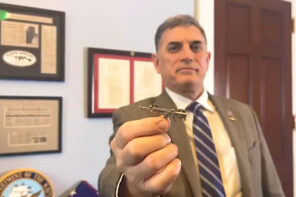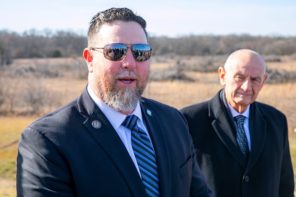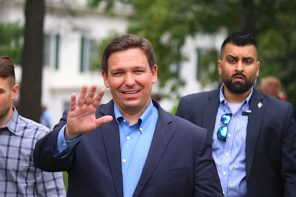A deeply worrisome story was reported with a simplicity bordering on irresponsibility by CNN some days ago.
Two representatives from the Georgia state legislature, Calvin Hill and Charlice Byrd, have proposed using the current budget crisis as a way to regulate what is taught at the state’s colleges. (The shortfall is so large in Georgia that the Republican Governor, Sonny Purdue, has recently proposed a tax increase, albeit an increase in property taxes, the wisdom and justice of which are debatable.) After mistaking a list of faculty created specifically for media outlets for a university course guide (in fact it identified their areas of research expertise), these state legislators began calling for an investigation of colleges throughout the Georgia state system (27 four-year campuses in all), in order to weed out courses that should not be taught, and quite possibly, to downsize further by removing such instructors from the faculty rolls.
Two areas were targeted initially when the story broke on February 10th; both involved—what else?—sex. One professor at the Georgia State University was listed as an expert on oral sex, and another was identified as an expert on male prostitution. Such courses, suggested the primrose legislators of Cherokee County, were unworthy of state sponsorship and tax dollars.
To its credit, the university administration quickly came to the defense of their embattled faculty, insisting first, that these were not courses but research areas, and second that both represented legitimate and important areas of contemporary scholarly research. Hastily-called hearings made mincemeat of the original objections of the two legislators who opted out of asking any questions themselves, and subsequently apologized for the whole thing.
What we learned there, or should have learned, was important and illuminating. It is a sociological phenomenon of some note, the apparent perception among young people (and some former US presidents) that only genital intercourse “counts” as sex; what this means is that any number of other behaviors that put teens at serious risk are undertaken far more casually. A study of the sociology of oral sexual expression thus possesses the very greatest public health significance; it is not offering students a chance to “talk dirty” on the public dime.
Next, we learned about an important study first published in the New England Journal of Medicine, one examining the role of male prostitution in rates of HIV transmission, a study bearing enormous significance in a state like Georgia that, in addition to housing the Centers for Disease Control, ironically has one of the highest rates of HIV-infection in the country. This study of male prostitution and its relation to the global AIDS epidemic has also attracted tremendous external funding resources to the university; it is not the sort of thing one wants to shut down in the middle of a budget crisis.
That was where things stood—until CNN “broke” the story a week later, prompting a second round of debate on these deeply divisive matters. Now a third university professor, from the University of Georgia this time, was added to the fires of public controversy. He was identified as an expert in “Queer Theory.” And in a superficial story such as the one we heard on CNN, all we got was that word: “queer.” What was not said was that Queer Theory is a significant movement within the Humanities that cuts across various fields of enquiry, one that involves far more than an investigation of the normative quality and the socio-cultural sources of sexual identity.
Queer Theory has become a depth analysis of the ways human societies use categories of all kinds to define, and often to segregate or otherwise marginalize, various classes of people. Queer Theory, in short, is aimed against simplicities, the prejudicial misrepresentations, and the uninformed objections voiced by these state legislators. Queer Theory invites us to ask what is really driving the desire human beings display to represent others in these ways. It is altogether mainstream, as an exercise in critical, historical thinking.
The university administrations are to be credited for their spirited defense of their faculty and of these lines of enquiry. But I am concerned that to argue in this way, and to consent too quickly to hearings, is to give up the very ground for which we should be fighting. To permit ourselves to be dragged into an argument over the legitimacy of such courses is, in some important ways, to lose the battle before a shot has been fired.
The strategy of these Republican legislators is very clear, after all. Under cover of budgetary crisis, they are attempting to insert themselves into the governance of the university and the policing of the college classroom, a staggering increase in legislative power and outreach that is entirely unconstitutional (unless, as some extremists have proposed, the legislature votes to disband the State Board of Regents as well, thereby returning this power to itself).
As such, this is a matter not only of free enquiry—the very lifeblood of the modern academic enterprise, with all the attendant risks of excess and of failure that such enquiry entails—but of free speech itself. The very gag-rule to which international public health organizations were subject until very recently is now to be replicated at the college level right here at home. These legislators have come dangerously close to suggesting that teaching about oral sex rises to the level of shouting “Fire!” in a crowded theater.
In this way they work at cross purposes to the fundamental ethos of higher education—by infantilizing our students, our citizenry, and themselves. Rather than engage in robust debates about matters of significance to various constituencies, they try to squelch such debate by prohibiting the speech itself, in a contemporary version of Know-Nothing politics we can ill afford in the context of our current crises. A stimulus package ought not be reduced to preventing our best and brightest faculty from stimulating the powers of critical reasoning and the potential for new insights these powers create.
The Cold War is over and, to use an ironic phrase Sherman used in the summer of 1864, “fairly won.” So the new MacCarthyism turns to a perennial and equally exploitable foe: sexuality.
We should, all of us, be very concerned about the chilling winds blowing back the springtime in Atlanta.




